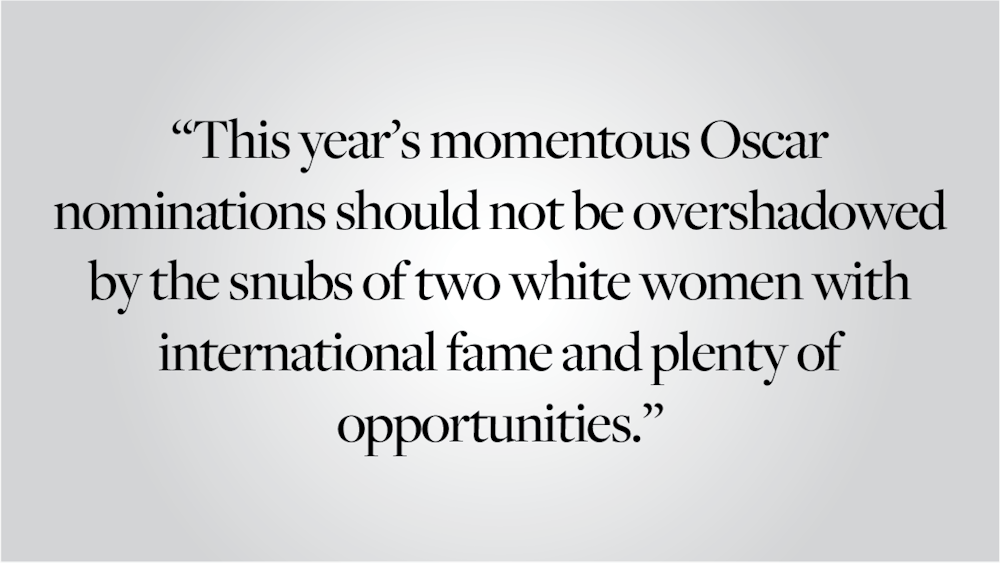Since the #OscarsSoWhite Campaign gained traction on Twitter in 2015, it seems the Oscars have come to represent deep the flaws in our society rather than a celebration of art. While at times they provide memorable pop culture moments and a few inspirational speeches, it seems like the Oscars are better known within the cultural zeitgeist for what they get wrong. Every year, there is an uproar about a stellar performance not receiving a win, or often even a nomination. This year, outrage surfaced when Margot Robbie and Greta Gerwig did not receive nominations for their works in “Barbie” (Best Actress and Best Director, respectively).
These snubs most often affect women and people of color In its 95 years and 13,253 nominations, only 16% of Oscar winners have been women and a staggeringly low 6% have been non-white (less than 2% being women of color). Only eight women have been nominated for Best Director and only three have ever won. Halle Berry and Michelle Yeoh are the only women of color to have won the Oscar for Best Actress. Despite the Oscars lack of appreciation for marginalized communities, this year did provide an optimistic and historic round of nominations.
Women of color held the majority of nominations for Best Actress for the fifth time in Academy history. Among them is Lily Gladstone, the first Native American acting nominee in the award’s history. Four of the Best Picture nominees were movies that included non-English languages and a record three women-directed films nabbed a Best Picture nod. This year’s momentous Oscar nominations should not be overshadowed by the snubs of two white women with international fame and plenty of opportunities.
“Barbie” was undeniably historic. It is, as of now, the highest grossing movie to be single-handedly directed by a woman and the 14th highest of all time. It has joined a selective group of very few female-centered or female-directed movies to earn a Best Picture nomination. But, it’s ironic that a movie about feminist sisterhood, no matter its success, would overshadow huge wins for women of color.
Yes, “Barbie” was a great movie. No, I don’t believe that Margot Robbie gave an Oscar-worthy performance as the titular character. And while Gerwig being nominated for Best Picture but not Best Director is suspicious at best, she has already been nominated for an Oscar four times.
It’s hard not to cry white feminism when the anger over snubs only seems to extend to white women. If everyone is so up in arms about certain women deserving an Oscar nomination, why is nobody mentioning director Celine Song and actress Greta Lee, who both got snubbed for their work on “Past Lives,” widely regarded as one of the best films of the year? Song would be only the second woman of color to be nominated for Best Director, and Lee the second Asian woman for Best Actress. If everyone wants actresses to be recognized for their work, shouldn’t “Barbie” fans be ecstatic for America Ferrera, for whom this is only the first Oscar nomination after a prolific 22-year career spanning film, stage and television? Or Danielle Brooks and Da’Vine Joy Randolph for their first nominations?
The issue here is not the frustrations about Robbie and Gerwig being snubbed. Everyone is entitled to their opinions, especially when it comes to something as subjective as film. It is valid to believe that if two women have had such notably successful years, they should be recognized by the most prestigious film awards in the world. The issue is actually the lack of interest and passion for women of color getting either nominated or snubbed. It’s the belief that any mildly substantive project by or for white women deserves every award under the sun. It’s calling yourself a feminist but only running to the defense of women who look like you.
As a cultural moment, “Barbie” was a massive step forward for women in film. But when we look at the big picture, what is more misogynistic? The Academy for not nominating two white women who are famously darlings of the industry, or the opinionated masses online overshadowing the historic year of nominations for women of color simply because two white women didn’t get yet another moment to shine?
Mary O’Riordan ’27 can be reached at mary_oriordan@brown.edu. Please send responses to this opinion to letters@browndailyherald.com and other op-eds to opinions@browndailyherald.com.




